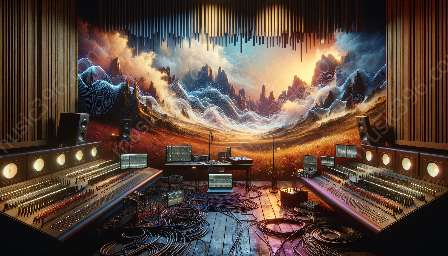Experimental music has always been at the forefront of challenging traditional norms, and this extends to intellectual property rights in an era of digital distribution. As avant-garde and industrial music continue to push boundaries, the implications on copyright, sampling, and creative ownership are profound and multifaceted. In this topic cluster, we'll delve into the intricate relationship between intellectual property rights and experimental music, exploring how digital distribution has both empowered and complicated the landscape for artists and creators in this genre.
1. The Evolution of Intellectual Property Rights in Experimental Music
Experimental music, with its innovative and unconventional nature, has often operated on the fringes of traditional copyright frameworks. This genre has embraced new ways of creating and disseminating music, challenging conventional notions of authorship and ownership. With the advent of digital distribution, experimental musicians have been able to reach wider audiences and explore new sonic territories, but this has also raised complex questions about the protection and exploitation of their artistic output.
1.1 Sampling and Fair Use
Sampling, a prevalent practice in experimental and industrial music, has long been a contentious issue in the realm of intellectual property rights. As artists blend and manipulate pre-existing sounds to create new sonic experiences, questions of fair use, copyright infringement, and derivative works come to the fore. Digital distribution has amplified these concerns, as the ease of sampling and remixing has led to legal disputes and challenges to traditional copyright laws.
1.2 Creative Commons and Alternative Licensing
Some experimental musicians have sought alternative approaches to intellectual property rights through platforms like Creative Commons, which offer a spectrum of licensing options to facilitate the sharing and remixing of creative works. By embracing these open licensing models, artists in the experimental music community have sought to redefine the parameters of ownership and access, challenging the exclusivity of traditional copyright regimes.
2. Power Dynamics and Access in the Digital Era
Digital distribution has reshaped the power dynamics within the music industry, and experimental and industrial music are no exception. As streaming platforms and online communities democratize access to music, they also introduce new challenges for creators seeking to protect their intellectual property. Understanding these dynamics is essential for navigating the evolving landscape of rights and ownership.
2.1 Alternative Distribution Models
Experimental musicians have often leveraged unconventional distribution models to bypass traditional gatekeepers and connect directly with their audience. However, this direct-to-fan approach can also complicate issues of ownership and control, as artists navigate the balance between maintaining independence and safeguarding their intellectual property in the digital domain.
2.2 Global Reach and Cultural Appropriation
As experimental music reaches global audiences through digital platforms, questions of cultural appropriation and ethical engagement with diverse musical traditions come to the forefront. The complexities of navigating intellectual property rights in a borderless digital landscape require artists and industry stakeholders to consider the global impact of their creative output and the implications for cultural exchange.
3. The Role of Technology and Innovation
Technological advancements have both empowered and challenged the intellectual property rights of experimental music. From algorithmic composition to blockchain-based royalties, innovations in music technology have significant implications for creators and rights holders in this genre.
3.1 Algorithmic Composition and Ownership
The use of AI and algorithmic tools in experimental music composition raises intriguing questions about authorship and ownership. As artificial intelligence becomes increasingly integrated into the creative process, the delineation of intellectual property rights becomes more complex, demanding a re-evaluation of traditional copyright paradigms.
3.2 Blockchain and Transparent Royalties
Blockchain technology has emerged as a potential solution to the challenges of royalty distribution in the digital age. By enabling transparent and immutable record-keeping of rights and royalties, blockchain holds promise for addressing issues of transparency and fairness in the distribution of intellectual property rights within experimental music.
4. Future Trajectories and Open Dialogues
The implications of digital distribution on intellectual property rights in experimental and industrial music are continually evolving. Looking to the future, it is essential to engage in open dialogues that consider the intersection of artistic innovation, technological disruption, and ethical considerations in the realm of creative rights and ownership.
4.1 Advocacy and Community Engagement
Empowering artists to advocate for their rights and fostering community engagement around intellectual property issues are crucial steps in shaping a more equitable and sustainable future for experimental music. By amplifying diverse voices and perspectives, the experimental music community can contribute to more inclusive frameworks for intellectual property rights.
4.2 Cross-Disciplinary Collaboration and Knowledge Exchange
The intersection of intellectual property rights and experimental music extends beyond the music industry, calling for cross-disciplinary collaboration with legal experts, technologists, and policy-makers. By fostering knowledge exchange and interdisciplinary dialogue, innovative solutions can be developed to address the complex challenges posed by digital distribution in this dynamic and boundary-pushing genre.































